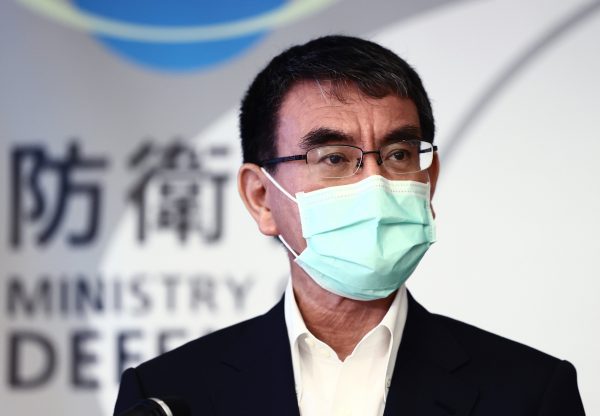Analysts have moved quickly to address a number of important strategic questions raised by the cancellation. For one, there is the future of Japan’s missile defence capabilities and overarching policy frameworks to consider. To that end, the government has already moved to revise both the 2013 National Security Strategy and 2018 National Defence Program Guidelines as it looks towards other potential capability options.
But the range of possible alternatives to Aegis Ashore come with cost and technical challenges not entirely dissimilar to those of the cancelled system. Critically, the incident also raises questions of the internal processes and overall direction of the US–Japan alliance, including the potential effects of the decision on alliance cost-sharing negotiations scheduled for later this year.
Domestic political factors are at play too. Scrapping the project may have ended a political liability for the government given the tenacity of local opposition and the series of gaffes leading up to the cancellation. Yet the decision could also stimulate debate regarding the perennial and highly contentious issue of constitutional revision — one which has been largely overshadowed by the COVID-19 pandemic.
In that respect, Prime Minister Shinzo Abe did not miss a beat in leveraging the situation to renew his push for revision to Article 9 of Japan’s constitution — the passage foreswearing the exercise of military force to settle international disputes. Speaking at a news conference following Kono’s initial announcement, Abe declared his desire to renew national discussions over ‘adequate deterrence’ in light of the Aegis cancellation, suggesting Japan should consider augmenting its self-defence posture with a pre-emptive strike capability.
The preemptive strike debate is a recurring one in Japan, and often coincides with North Korean provocations. Indeed, Abe referred to the threat posed by North Korea to justify his remarks — unsurprising given Pyongyang’s recent actions at the Kaesong Industrial Complex and missile tests earlier this year. Abe has considerable form in harnessing the North as Tokyo’s perennial security bogeyman for domestic political means. In the October 2017 general elections, for example, it was the Prime Minister’s hard-line approach to North Korea that saw his Liberal Democratic Party (LDP) secure a two-thirds parliamentary majority. Abe readily interpreted the result as a mandate to renew efforts at reforming Article 9.
While the LDP has for many years argued that ‘defensive’ strike capabilities would fall within the parameters of Article 9, it is inherently difficult to disaggregate the issue from wider debates about Japan’s overall security posture and constitutional revision. Notably, the Aegis cancellation comes at a time when COVID-19 has largely suppressed the government’s push for revision. For the best part of 2020, countrywide efforts by the LDP to rally support behind the effort have stalled due to the (albeit reluctant) implementation of various pandemic-related preventative measures across the country. These restrictions have prevented many pro-reform public gatherings and policy meetings from going ahead, and forced the LDP to suspend local campaigning by its constitutional revision promotion panel.
The Abe government has been criticised for trying to press the issue in the middle of a severe health crisis, as well as for its handling of other Constitution-related measures relating to the national emergency. A severe slump in public approval ratings due to the government’s perceived mishandling of the pandemic, not to mention persistent high-level scandals, have arguably sapped Abe’s political capital. This may undermine his ability to pursue contentious policy issues like constitutional revision.
But with coronavirus restrictions in Japan beginning to ease, supporters of revision may start to re-energise their efforts. Though he has missed the original target of achieving reform by mid-2020, Abe will likely remain hopeful of securing an amendment before his third term as LDP president — and as Japan’s Prime Minister — expires in September 2021. His recent comments should be seen as a redoubling of that commitment.
There is no reason to suggest that poor polling will prevent Abe and the LDP from pressing ahead with constitutional reform. Abe’s electoral windfall in 2017 materialised despite his personal unpopularity among voters. And the potential for further North Korean provocations in the near future could add further momentum to a renewed reform push — Japan’s latest Defence White Paper warned of substantive improvements in North Korea’s missile capabilities.
Whether or not that momentum would be translated into ‘yes’ votes in a prospective national referendum is questionable. Even when faced with North Korean provocations, public sentiment has remained overwhelmingly against revising Article 9 — a recent JiJi Press poll recorded opposition at 69 per cent.
Divisions within the governing coalition are also likely to impede an acceleration of the reform agenda. The LDP’s coalition partner Komeito is firmly committed to a strictly defence-oriented interpretation of Article 9, and the party’s leader Natsuo Yamaguchi recently expressed reservations about considering first strike alternatives to missile defence. LDP defence heavyweights are also split over the linkage between pre-emptive strike capabilities and national deterrence; Kono himself warned against such conflation in a rare foreign press briefing last month.
Finally, there is also no guarantee that Abe’s eventual successor will fare any better than he in campaigning for revisions. Though there are any number of potential candidates with defence and foreign policy experience to replace him, it is unclear whether they can succeed where Japan’s longest-serving prime minister has stumbled before them.
Still, by attempting to harness the Aegis Ashore setback as a new source of momentum behind the reform debate, Abe has shown that he intends to fight the revisionist fight to the end.
Tom Corben is a resident Lloyd & Lilian Vasey Fellow at Pacific Forum.

